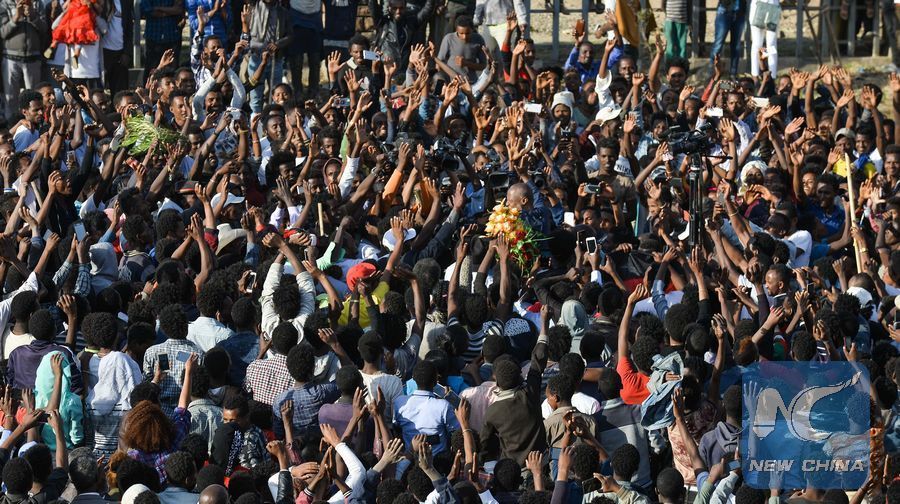
Supporters of Ethiopian opposition leader Merera Gudina take part in a demonstration along the streets of Addis Ababa, capital of Ethiopia, Jan. 17, 2018. (Xinhua/Michael Tewelde)
ADDIS ABABA, Feb. 22 (Xinhua) -- The Command Post that was established to watch over the implementation of Ethiopia's state of emergency on Wednesday issued details for the 6-month period.
Possession of armaments at public areas or transferring firearms to third party as well as providing support to activities which affect the peace and well-being of citizens are amongst of the restricted activities during the state of emergency period, state affiliated FANA Broadcasting Corporate (FBC) quoted head of the command post as saying on Wednesday.
Siraj Fegessa, Secretariat of the Command Post and Ethiopian Minister of Defense, while announcing details of the martial law, also outlined actions and measures that would be taken against individuals and groups found violating the directives.
The decree, among other activities, also prohibits issuing statement on security matters without the permission of the Command Post, distributing erroneous information that contradicts the law and the directives issued by the Command Post. It also forbids carrying weapons in unauthorized regions of the country.
The state of emergency, due effective as of Friday Feb. 16, was imposed by Ethiopian Council of Ministers, saying it was to protect the country's constitution, and the safety of citizens and their property from the dangers that would arise from the ongoing violent demonstrations in different parts of the country.
The state of emergency also outlines curfews prohibiting movement of individuals around infrastructures, investment areas and other related places.
It also prohibits obstructing transport services, carrying out attacks on infrastructures and development institutions, hampering activities of law enforcement bodies, and staging unauthorized demonstrations and meetings.
Actions that hinder the teaching and learning process at schools, strike at sport fields, committing violence inciting actions, hindering distributions of basic goods as well as obstructing cultural, public and religious festivals are also said to be illegal during the state of emergency period.
The command post also authorized Ethiopian security officers to take measure against individuals or groups that are found in breach of the curfew.
National Security Council of Ethiopia (NSCE) has recently urged citizens to respect the state of emergency.
The current 6-month state of emergency period is the second the East African country imposed since the second half of 2016. Ethiopia had witnessed a 10-month long state of emergency period since October 2016, following the Ethiopian parliament's decision on March 30 to extend the initial 6 months long period by an additional four-month.
According to Fegessa, the state of emergency would extend if the expected outcomes are not achieved.

